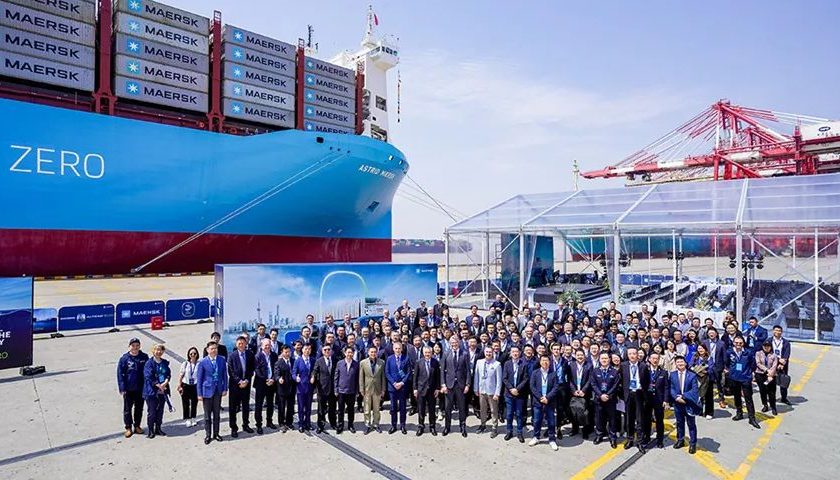Cepsa and Evos to storage green methanol in Algeciras and Rotterdam
NewsCepsa partners with Evos to store green methanol at their Algeciras and Rotterdam facilities, advancing sustainable energy initiatives.
SIGP facilitates Astrid Mærsk’s milestone green methanol bunkering operation in Shanghai, marking a notable first for China.

Maersk’s large methanol-powered container ship Astrid Mærsk has carried out its first green methanol bunkering with simultaneous cargo and bunkering operations in China.
The methanol bunkering operation took place at the Shanghai International Port Group’s (SIPG) Guandong Container Terminal in Yangshan Port Area. The fueling milestone holds immense importance as Shanghai bolsters its efforts to meet the needs of global shipping lines for methanol bunkering infrastructure at strategic ports.
The move is also part of the port’s decarbonization strategy and sets a precedent for other ports in China. The bunkering operation also coincided with Maersk’s 100th anniversary of serving China’s foreign trade.
Astrid Mærsk was bunkered by Hai Gang Zhi Yuan, China’s premier methanol bunkering ship and the world’s largest in operation.
Shanghai SIPG Energy Services Co., a subsidiary of SIPG Group, took delivery of the methanol bunkering vessel in January 2024. The 16,000 cbm vessel, previously known Jiuli 668, was converted at Zhoushan Putuo Changhong Shipbuilding in China. The conversion process has enabled Hai Gang Zhi Yuan to transport methanol and conduct ship-to-ship bunkering operations during container loading and unloading, thus enhancing its operational efficiency and meeting modern port requirements.
Investment in methanol bunkering vessels is part of SIPG’s mission of creating China’s first green methanol industrial chain with partner companies including COSCO Shipping, State Power Investment Corporation (SPIC), and China Certification & Inspection Group (CCIC).
“Maersk and SIPG have responded to the new trend of the industries’ green and low-carbon development, and have conducted fruitful cooperation in this field. Today, the first green methanol bunkering with simultaneous operation for a large ocean-going vessel at Shanghai port marks a new milestone between the two parties. It will undoubtedly enhance the strength of the Shanghai port to establish it as a major regional hub for green methanol fuel bunkering,” Jinshan Gu, Chairman of Shanghai International Port Group, said.
“We are delighted to bring ‘Astrid Mærsk’ to Shanghai and marking the first green methanol bunkering in China. This signifies a remarkable proof point of vital green methanol infrastructure coming into place and it underscores our focus on creating long-term value by seeking innovative solutions, foster collaboration, and embrace adaptability to meet the evolving demands of the society, customers and employees. With sustainability at the forefront of our agenda, we are committed to leading the way in decarbonizing global logistics for a greener future,” Silvia Ding, Managing Director of Maersk Greater China, said.
The 16,592 TEU Astrid Mærsk sailed from Yokohama, Japan to Shanghai after having its naming ceremony in early April. It is the second of Maersk’s 18 large methanol-enabled vessels, scheduled for delivery between 2024 and 2025. Utilizing green methanol, it achieves an impressive reduction of 280 tons of CO2 emissions per day compared to similar vessels powered by heavy oil.
Most recently SIGP also joined forces with South Korean shipping major HMM on the supply of methanol and LNG at Shanghai Port. The cooperation deal also covers supporting carbon reduction goals, promoting global shipping new energy cooperation, and helping shipping energy transformation and sustainable development.
HMM has committed to achieving Net-Zero emissions target for the entire business by 2050. To accomplish this aim, it is critical to establish port bunkering infrastructure for clean marine fuel.
The company has nine 9,000 TEU vessels powered by methanol on order, and plans to operate two 7,700 TEU LNG-powered vessels by the end of this year.
From a strategic perspective, establishing methanol bunkering infrastructure in ports is paramount, especially considering that many ports currently lack such facilities. As container shipping companies increasingly pivot towards methanol as a marine fuel, ports that fail to adapt risk being left behind in an evolving industry landscape. By proactively investing in methanol bunkering infrastructure, ports can position themselves as key hubs for sustainable shipping operations, attracting environmentally conscious shipping companies and gaining a competitive edge in the market.
By subscribing you will have: